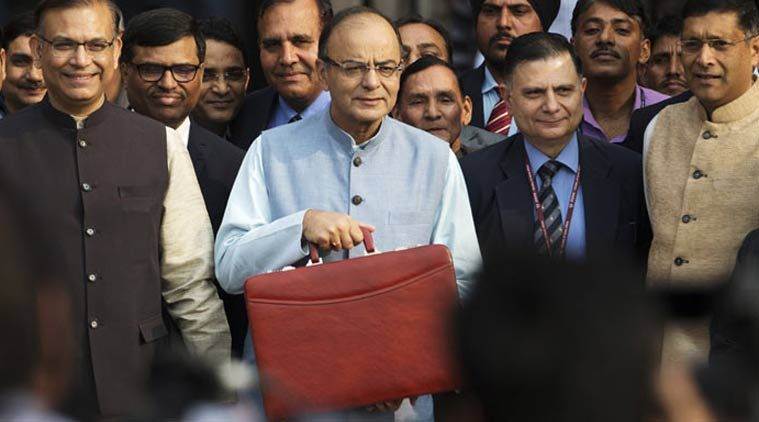- India
- International
Arun Jaitley, the farmers’ finance minister
Arun Jaitley hoped to transform agri-markets, subsidy structures. Implementing these ideas would be a fitting tribute to him.
 Arun Jaitley. (File)
Arun Jaitley. (File)
There have been several obituaries of Arun Jaitley. Most focus on his contribution to the BJP as a political strategist, or to the nation through GST-type reforms, or as personal friend, including by those occupying the opposition benches in Parliament. But I have not read anything about how he contributed to agriculture policies. And that’s what I want to focus on.
Before I venture into this less-known aspect of Jaitley’s contribution, let me say that we both studied together at the Shri Ram College of Commerce (SRCC), in the same batch (1970-73), with Arun in commerce and me in economics honours. After SRCC, he went on to do a degree in law and I pursued economics in Delhi School of Economics. But I did watch his rise in politics and public affairs from his Delhi University Student Union (DUSU) president days to being imprisoned during Emergency, and then later being the crowd-puller for Atal Bihari Vajpayee during his election campaigns. Like Arun, I too had the privilege to work with Vajpayee ji when he became prime minister in 1998. But my interaction with Arun on issues related to agriculture started more when he became finance minister in the Narendra Modi government in 2014.
In 2015, at Rashtrapati Bhavan, I happened to be one of those Padma awardees. Immediately after the ceremony, Jaitley, who was sitting in the front row, came to congratulate me and then said, “Ashok, I read your piece ‘Lead from the Centre’ today in The Indian Express, and what you are saying, that we need to invest much more in irrigation, makes a lot of sense to me, especially when India is facing occasional droughts. I think we can do it.” I thought his words were a normal gesture on such an occasion. But I was pleasantly surprised when I found him announcing a special scheme for a “Long Term Irrigation Fund” of Rs 40,000 crore through NABARD in his next budget speech. The scheme helped many languishing major and medium irrigation projects to move somewhat faster towards completion. He was a silent doer with regard to many such schemes.
On another occasion, I was called to give a presentation to him and his key advisors in the Ministry of Finance on revamping the crop insurance scheme in the wake of the back-to-back droughts of 2014 and 2015. He listened attentively and then asked how much extra it will cost. And my curt reply was that the central government was already giving away to states about Rs 6,000-7,000 crore per annum through the PM’s Disaster Relief Fund. The modalities adopted in compensation were not very scientific. But if you go for a proper crop insurance system (I suggested it be weather-based with high-tech automatic weather stations installed all over the country), it may cost the Centre a bit more — say another Rs 5,000-7,000 crore, but it can be made more science based. His immediate response was, “This is doable”. After that presentation, what I heard was an announcement by the prime minister about the revamped PM’s Fasal Bima Yojana on Baisakhi day as a gift to Indian farmers. It is still going through teething problems as, instead of being weather based, it was rolled out on crop cutting experiments, which can be manipulated through the patwari system.
But the biggest agri-idea that came from Jaitley, and many heard it during the last year or so on various occasions, was when he said that the highest pay-off from economic reforms, after the GST reform, is to come from agriculture. He knew that agriculture is a state subject, and if one has to reform agri-markets by amending Essential Commodities Act and APMC Act, engaging states in “cooperative federalism” would be essential. He spoke about this idea, loud and clear, at one of the foundation day functions of NABARD. He was also clear that the push for such a reform has to come from the Centre. In fact, he even asked NABARD to initiate some spade work in this direction.

Similarly, if one has to undertake any tenancy reforms with a view to open up land lease markets, the blueprint has to be of something like the GST council, involving both the states and the Centre.
The other big agri-idea with which Jaitley concurred was to gradually transform various subsidies in the agri-food space to cash transfers directly into the accounts of beneficiaries. He said this while releasing one of my books, Supporting Indian Farms the Smart way, in 2018. The book was based on two years of in-depth research on how different agri-policies impact Indian farmers, agriculture, food security, natural resources, especially water and soil, etc. The central message was that Indian agricultural policies have an inherent consumer bias, and that input subsidies related to fertilisers, power, irrigation, interest subvention, etc do not promote efficiency in their use. Instead, they are creating several environmental problems like groundwater depletion. The best way forward would be to give these subsidies directly to beneficiaries in cash and free up the highly subsidised prices of fertilisers, power etc. He echoed this in his speech and said that this is surely a “smarter” way to help our farmers.
It is sad that Arun Jaitley’s health deteriorated so quickly and he is no longer with us. The best tribute to such a personality is to implement his ideas fully, in good faith. Can the Modi government create a GST-type council for agriculture reforms and realise his wishes by implementing agri-marketing reforms and transferring agri-input subsidies directly to beneficiaries’ accounts through Aadhaar? That would be the most meaningful tribute to Arun Jaitley.
Gulati is Infosys Chair Professor for Agriculture at ICRIER
40 Years Ago
EXPRESS OPINION
Best of Express
More Explained
Apr 18: Latest News
- 01
- 02
- 03
- 04
- 05









































